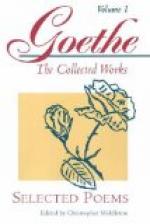Strains the lover holds so dear,
Though like sighs and wailings ringing
In the mournful captive’s ear,—
With what heart-emotion blest
Do ye hearken to the bell,
Wont of safety and of rest
With twelve solemn strokes to tell!
Therefore in each heavy hour,
Let this precept fill your heart:
O’er each day will sorrow loud,
Rapture ev’ry night impart. ----- Epilogue to Schiller’s “Song of the bell.”
[This fine piece, written originally in 1805, on Schiller’s death, was altered and recast by Goethe in 1815, on the occasion of the performance on the stage of the Song of the Bell. Hence the allusion in the last verse.]
To this city joy reveal it!
Peace as its first signal peal it!
(Song of the Bell—concluding lines.)
And so it proved! The nation felt, ere long,
That peaceful signal, and, with blessings fraught, A new-born joy appear’d; in gladsome song
To hail the youthful princely pair we sought; While in a living, ever-swelling throng
Mingled the crowds from ev’ry region brought, And on the stage, in festal pomp array’d The homage of the arts * we saw displayed.
(* The title of a lyric piece composed by Schiller in honour of the marriage of the hereditary Prince of Weimar to the Princess Maria of Russia, and performed in 1804.)
When, lo! a fearful midnight sound I hear,
That with a dull and mournful echo rings. And can it be that of our friend so dear
It tells, to whom each wish so fondly clings? Shall death overcome a life that all revere?
How such a loss to all confusion brings!
How such a parting we must ever rue!
The world is weeping,—shall not we weep
too?
He was our own! How social, yet how great
Seem’d in the light of day his noble mind!
How was his nature, pleasing yet sedate,
Now for glad converse joyously incline,
Then swiftly changing, spirit-fraught, elate,
Life’s plan with deep-felt meaning it design’d,
Fruitful alike in counsel and in deed!
This have we proved, this tasted, in our need.
He was our own! O may that thought so blest
Overcome the voice of wailing and of woe
He might have sought the Lasting, safe at rest
In harbour, when the tempest ceased to blow.
Meanwhile his mighty spirit onward press’d
Where goodness, beauty, truth, for ever grow;
And in his rear, in shadowy outline, lay
The vulgar, which we all, alas, obey!
Now doth he deck the garden-turret fair
Where the stars’ language first illuded his
soul,
As secretly yet clearly through the air
On the eterne, the living sense it stole;
And to his own, and our great profit, there




